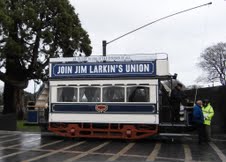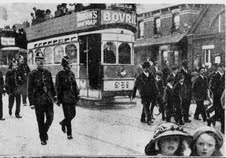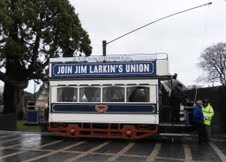There is a new blog on the National Library of Ireland site on the battle for union recognition in Sligo during 1913. Unlike that in Dublin it ended in victory although one ITGWU docker, Patrick Dubar, was killed and dozens of dockers were imprisoned during it
http://www.nli.ie/blog/index.php/2013/03/08/sligo-dispute
Padraig Yeates on March 8, 2013 | Filed Under Uncategorized | Comments Off on Sligo – a forgotten victory from 1913

“Publicists of all kinds, philanthropists, literary men, lovers of their kind, poets, brilliant writers, artists, have all been conquered by the valiant heroism of the Dublin workers …”
James Connolly spoke these words about the 1913 Lockout – the 100th anniversary of which occurs this year. Indeed, it is through the most famous novel of one of Ireland’s most renowned social commentators, James Plunkett’s Strumpet City, that we can reach back and watch the Lockout unfold.
It is thus very fitting that The Irish Writers’ Union, together with the Irish Writers’ Centre, ICTU, the Dublin UNESCO City of Literature, Dublin City Council and the 1913 Committee, have launched the James Plunkett Short Story Award.
This award is open to anyone to enter. Rather than a single competition, the Plunkett Award will run three ‘mini’ competitions. Three winners from each will be selected to compete for an overall prize in October. At that point, a prize of €2,000 will be awarded to the winner, with €1,000 to the runner up and €500 for the third place. Additionally, each of the ‘mini’ competition winners will get to speak at the prestigious Irish Writers’ Centre. The winner will get to read their work at an event in Dublin Libraries later in the year as part of its One City, One Book promotion. This year, the libraries have chosen Strumpet City. Finally, talks are being held to have the winning entry published in a journal of repute – there will hopefully be an announcement on this very soon! (more…)
Padraig Yeates on February 24, 2013 | Filed Under Uncategorized | Comments Off on James Plunkett Short Story Award – entries welcome – starting now!

Kevin Myers makes a very selective cull of Jim Larkin’s long and stormy career to character assassinate him and present a picture that is as unjustified as the ‘union cult of Larkin’ he seeks more legitimately to question. As an equally selective quote from my speech at the commemoration to mark Larkin’s death on January 30th, 1947, is recruited to Mr Myers’ task I would like to respond to his virulent caricature of Larkin and the 1913 Lockout, which is one of the first major commemorative events of the current Decade of Centenaries.
Firstly, the full sentence from my speech which Mr Myers’ quotes reads, ‘If we are to be honestly true to the legacy of Jim Larkin it behoves us to abandon our sectarian comfort zones and to devise the best strategy we can to protect and advance the cause of working people’. It is the latter point that I was seeking to emphasise and that is what Larkin sought to achieve throughout his life, not always wisely but certainly selflessly. In the process he brought the ‘new unionism’ to Ireland, enabling unskilled and semi-skilled workers to seek representation and collective bargaining in the workplace. This was something denied to them by Dublin employers, although conceded across much of the United Kingdom. (more…)
Padraig Yeates on February 22, 2013 | Filed Under Uncategorized | Comments Off on What our history really has to teach us about Big Jim Larkin – Jack O’Connor Irish Independent, Thursday February 21st, 2013

‘WE ARE here today to commemorate James Larkin, the founder of our union and the modern labour movement,” declared Jack O’Connor, president of SIPTU, recently. “If we are to be honestly true to the legacy of Jim Larkin, it behoves us to abandon our sectarian comfort zones.”
Good. So let’s revisit some of Larkin’s “sectarian comfort zones”. In December 1915, at the height of The Lockout, the founder of the Irish Transport & General Workers Union refused to attend a fundraising rally in Grimsby, because the proposed chairman, Ernest Marklew, was a divorcee. The sellout meeting had to be cancelled, with a huge financial loss to the Lockout workers. (more…)
Padraig Yeates on February 22, 2013 | Filed Under Uncategorized | Comments Off on The union cult of Larkin is built on factually baseless myths says Kevin Myers – Irish Independent, Tuesday, February 19th, 2013
More than 100,000 people took part in demonstrations across the country today, in protest at the country’s continued bank debt burden. The protests were organised by the Irish Congress of Trade Unions and took place in Dublin, Cork, Galway, Limerick, Waterford and Sligo. Over 60,000 took part in the Dublin protest, while at least 15,000 turned out in Cork, 13,000 in Waterford, 10,000 in Limerick, 7,000 in Sligo and 5,000 in Galway.

Section of the ICTU demonstration in Merrion Square, Dublin
(more…)
Padraig Yeates on February 9, 2013 | Filed Under Uncategorized | Comments Off on Over 100,000 people join ICTU ‘Lift the Burden’ Protests across country

Barry Farrer (in blue coat) and Maurice Hayden (yellow) from the National Transport Museum) with Derek from Philip Clarke Transport putting 1913 Tram in position. It goes back to the Museum tomorrow afternoon (Feb 2nd). It can of course be viewed there – enter Deerpark in Howth and take first turn right. Open Saturdays and Sundays 2-5pm
Padraig Yeates on February 1, 2013 | Filed Under Uncategorized | Comments Off on 1913 Tram at Glasnevin Cemetery until Saturday

Tram operated by scab under police protection in Dublin, 1913

- Tram being brought by National Transport Museum to Glasnevin Cemetery to participate in Jim Larkin commemoration earlier today, January 30th, 2013
Padraig Yeates on January 30, 2013 | Filed Under Uncategorized | Comments Off on Then and Now

Bill Garriock of the National Transport Museum, one of the Volunteers who braved storm force gales and lashing rain to install a 1913 Vintage Tram at Glasnevin Cemetery today, January 30th, 2013 to mark the 66th anniversary of Jim Larkin’s death
Speech by Jack O’Conor, General President of SIPTU, at 66th anniversary of the death of Jim Larkin, Glasnevin Cemetery, Dublin, January 30th, 2013
Comrades and Friends
We are here today to commemorate the life of Jim Larkin, the founder of our union and of the modern Irish labour movement. He virtually transformed the traditional, narrow outlook of guild trade unionism into a vibrant, modernising mass movement. In celebrating his life we are reiterating our own commitment to the values of equality, fraternity and solidarity for which he stood.
Remarkably we are doing so in the context of the extraordinary coincidence between the Centenary of the Great Dublin Lockout and the unfolding collapse of the global economic system which reflected the values of those who locked out the workers Larkin led in 1913. Indeed, we find ourselves in the front line, as those at the top of the financial system in Ireland and in Europe who caused the crisis in the first place are systematically exploiting the opportunity it presents to recalibrate the relationship between Capital and Labour across the continent. (more…)
Padraig Yeates on January 30, 2013 | Filed Under Uncategorized | Comments Off on Romanticised images of the past betrays Larkin’s legacy
It exposed contradictions that had to be worked through in independence, says Carol Hunt in today’s (January 27th, 2013) Sunday Independent
‘DORA Montefiore — she was young, she was opinionated, she was English and Jewish, she was a socialist; you couldn’t concoct a better hate figure for the Catholics [in Ireland]. And she was coming over here telling people what to do.”
From his office in Liberty Hall, author, journalist and labour historian Padraig Yeates can point to the site of the old Tara Street baths and explain what happened when Dublin parents, desperate to have their sick and starving children taken to sympathetic homes in England (as suggested by Montefiore in consultation with James Larkin), went against the wishes of the Catholic Church and its allies.
“She came over [to Dublin] and they had a lot of mothers besieging Liberty Hall, the original building. They took the children over to Tara Street baths — to delouse them, give them new clothes — and when they came out there was a howling mob waiting for them, led by curates from Westland Row church, and they literally took the children off the parents to save them, or save their souls at least,” he adds drily. (more…)
Padraig Yeates on January 27, 2013 | Filed Under Uncategorized | Comments Off on 1913 Lockout was far more than just a curtain-raiser

To mark the centenary of the 1913 Lockout, the Progressive Film Club plan is running a series of films on the themes of labour struggles and workers’ rights throughout the coming year.
It kicks-off on Saturday, January 26th with two films about factory occupations – one in Argentina and the other in Cork.
2.30pm: The Argentinian film ‘The Women of Brukman’ tells of the take-over of a clothing factory by the workers, of a clothing factory after it had been abandoned by the owners.
4.00pm: The main feature ‘161 Days’ recounts the story of another group of textile workers at the Vita Cortex plant in Cork, who occupied their plant after agreed redundancy payments had not been met. The occupation was one of the longest industrial disputes in Ireland. This will be the first public screening of the film in Dublin.
NB. This screening is not taking place at the usual venue in the New Theatre but at the Pearse Centre, 27 Pearse St., Dublin 2.
Further details and the Club’s programmes for the next three months are now available on its website
http://www.progressivefilmclub.ie/
Padraig Yeates on January 22, 2013 | Filed Under Uncategorized | Comments Off on Progressive Film Club launches 1913-2013 season with Vita Cortex occupation film










